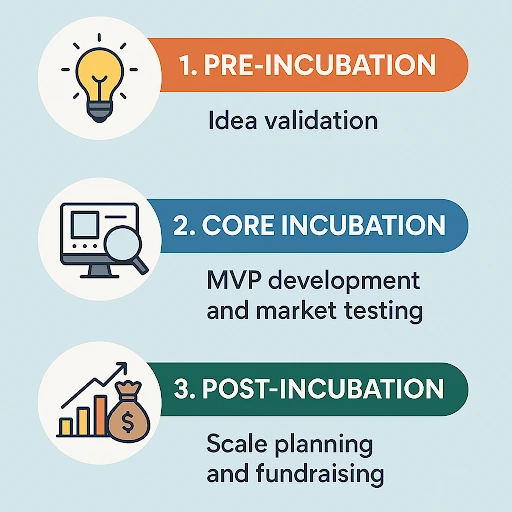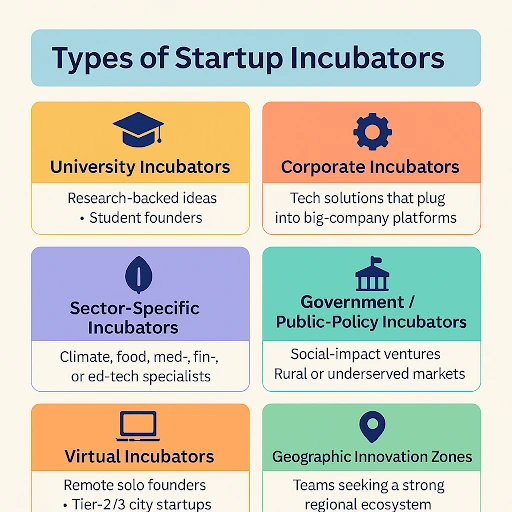What Are Startup Incubators and How Do They Help Founders Succeed?

You've got the idea. Maybe even a pitch deck. But everything feels like a guessing game. What’s the right go-to-market strategy? How do you validate without burning cash? Who’s going to fund a half-built product?
Most early-stage founders hit the same wall: you know where you want to go, but not how to get there. That’s where a startup incubator can change the game.
It helps bridge the gap between a raw idea and a real business. It offers guidance, structure, and the kind of hands-on support that solo founders or small teams just can’t access on their own. From mentorship to infrastructure, these incubators give you the tools to build momentum, validate faster, and avoid costly mistakes during those make-or-break early days.
In this blog, we’ll unpack what a startup incubator is, the types, how the incubation process actually works, and most importantly, how startup incubators help founders build smarter, faster, and stronger.
What is a startup incubator?
A startup incubator is a program designed to help early-stage startups venture build by providing them with mentorship, workspace, training, and access to investors. These incubators are usually run by universities, government bodies, or private organisations with the goal of supporting innovation and entrepreneurship.
Unlike accelerators, which focus on scaling startups fast, incubators support ventures during their earliest and riskiest phases. They guide founders through business fundamentals like refining their idea, building an MVP, and finding product-market fit. This hands-on environment reduces the guesswork in those critical early stages.
You may also come across terms like business incubator, entrepreneur incubator, incubation centre, or even pre-seed hub all variations of the same support model. While many operate on a non-profit or grant-funded basis, others follow equity-based or hybrid funding models. Here’s a breakdown of how startup incubators make money, depending on their structure and goals.
Today, there are over 7,500 incubators[1] worldwide, serving millions of startups navigating the uncertain first steps of business building.
It’s common to confuse incubators with accelerators, but they serve different purposes depending on your stage. If you're wondering which one fits your startup, this comparison of incubators vs accelerators lays it out clearly.
How does a startup incubator work?
Joining an incubator isn’t just about finding a desk and free Wi-Fi. It’s about understanding the working of an incubator, such as how the program is structured to turn early-stage ideas into viable businesses.
Here's how most business incubators typically work:
-
Selection and onboarding: Startups apply through a structured application process. Selection is based on potential, founder vision, and stage (usually pre-seed to MVP).
-
Mentorship and training: Access to domain experts, seasoned founders, and structured sessions that accelerate learning.
-
Affordable workspace: Co-working space, admin support, and shared tools to reduce overheads and foster collaboration.
-
Access to funding: Connect with an investor network, pitch at a demo day, or explore grants and credits.
-
Equity or fee-based model: Some incubators take an equity stake in exchange for support; others operate as non-profits or charge a flat fee.
Every incubator operates slightly differently, but most follow a predictable rhythm. Just keep in mind: not every startup incubator guarantees funding or product success. It’s still on you to show up, do the work, and use the resources wisely. If you're planning to launch your own incubator, here's a guide on how to set up a business incubator from scratch.
Different stages of a startup incubator
Once accepted into a startup incubator, founders enter a structured journey designed to reduce risk, build traction, and prepare for scale.
This journey, often called the incubation process, typically unfolds in three key phases, no matter the incubator's business model or niche (whether it’s a tech incubator, university incubator, or something industry-specific).

Each stage serves a clear purpose: to help early-stage founders go from raw idea to real traction with the right mix of strategy, mentorship, and momentum.
Here’s how a typical incubation stage unfolds, from validation to launch and beyond:
1. Pre-incubation: Idea validation
This early phase is about stress-testing your idea. Through mentorship and networking, founders refine their problem statement, explore the market, and align on business goals.
It’s a crucial stage for pre-seed startups still working to define their ideal customer, value proposition, and product direction.
At this stage, founders should focus on the lean startup methodology to test hypotheses before burning cash on features no one needs.
2. Core incubation: MVP development and market testing
Here, the focus shifts to execution: building a prototype/MVP, validating it with users, and adjusting based on real feedback. Founders also gain access to an affordable workspace, pitch coaching, and are exposed to investor networks as they prep for their first demo day.
3. Post-incubation: Scale planning and fundraising
In this final stretch, incubators help startups map their growth roadmap, fine-tune their pitch, and start raising funds.
Depending on the incubator's business model, this might involve introductions to VCs, pitch events, or tapping into an internal peer support network. Some also transition into an accelerator/incubator hybrid model for faster scale-up.
Read our guide to learn more about the stages of business incubation
6 key benefits of joining a startup incubator
Being part of an incubator doesn't mean founders only get more working space; they also get to shortcut trial and error, connect with the right people, and build real momentum.
These benefits underline the overall importance of business incubation in turning fragile ideas into investable businesses.
-
Mentorship and coaching: Direct access to experienced founders and operators who help you avoid costly missteps.
-
Affordable workspace and shared tools: Working area, admin support, and resources that keep operating costs low while fostering collaboration.
-
Investor access and signalling: Connect to the right investors through demo days and personal introductions. Being part of a trusted startup incubator also sends a strong signal that your startup is worth paying attention to.
-
Structured milestones and accountability: Clear timelines and check-ins push you to stay focused and hit real business goals.
-
Community and peer support: A built-in founder community where you’ll find emotional backing, advice, and people solving similar problems.
-
Higher survival and growth rates: Startups nurtured in incubators experience a five‑year survival rate of around 87%[2], compared to just 44% for non-incubated ventures.
Types of startup incubators and who they’re best for
Not all startup incubators are created equal. Depending on your stage, sector, and goals, the right fit can look very different. Some programs focus on student entrepreneurs, others on scaling climate tech. The key is understanding which incubator model aligns with where you are and what you need.

Here are the most common types of business incubators, along with the kinds of startups that benefit most from each:
1. University incubators
Run by academic institutions, these incubation programmes often support student-led or research-based ventures with access to faculty advisors, labs, and early grants.
Best for: Research-backed startups, student founders, and early-stage teams working on academic innovations.
2. Corporate incubators
These are backed by large companies looking to encourage innovation in areas that align with their strategic goals. Examples include Google's Area 120 or Intel Ignite.
Best for: Tech startups with a clear industry application, or teams building B2B solutions that could integrate with existing platforms.
3. Government & public-policy incubators
Often part of national innovation missions (like India’s Atal Innovation Mission), these are designed to increase regional entrepreneurship and solve public-sector challenges.
Best for: Social impact startups, public-good tech, and ventures targeting rural or underserved markets.
4. Sector-specific incubators
Some incubators focus solely on industries like climate tech, food innovation, medtech, edtech, or fintech, offering specialised mentors, partners, and regulatory guidance. A design-heavy venture may benefit from mentors who specialise in UX design for startups to nail onboarding flow early.
Best for: Founders building in niche markets who need domain-specific support and credibility from day one.
5. Virtual incubators
Fully remote programs that provide mentorship, training, and community online. Great for founders outside metro hubs or juggling a job on the side.
Best for: Solo founders, startups in tier-2/3 cities, or those bootstrapping without access to urban startup ecosystems.
6. Geographic incubators/innovation zones
These are place-based hubs designed to spark local innovation (e.g., T-Hub in Hyderabad). They often partner with local governments, universities, and VCs.
Best for: Startups that want to plug into a regional founder community and access India’s fast-growing local ecosystems.
Incubator vs. accelerator: Do you need both?
Founders often mix them up, but the difference between an incubator and an accelerator program comes down to stage, speed, and goals. Here's how they compare:
| Feature | Startup Incubator | Accelerator |
|---|---|---|
| Stage | Idea-stage, pre-seed, no MVP yet | Post-MVP, early traction, ready to scale |
| Duration | 6–18 months | 3–6 months |
| Focus | Incubation process, validation, building foundations | Scale-up, growth, fundraising |
| Support | Mentorship, co-working space, founder community | Mentorship, investor network, pitch prep |
| Funding Model | Usually non-profit, low or no equity | Typically involves funding + equity stake |
| Outcome | Refined idea, MVP, early validation | Rapid growth, investor readiness, expansion |
So, which one do you need right now?
Quick decision checklist:
-
Still validating your idea or building your first prototype? → Startup incubator
-
Have traction and looking to raise or expand fast? → Accelerator
Check out our guide to learn more about startup accelerators and how they function
Common pitfalls and how to avoid them
It’s not guaranteed that all startup incubators will deliver on their promises, and choosing the wrong one can derail your momentum. From unprofessional equity grabs to weak mentorship, here’s what to look out for (and how to dodge the damage):
-
Equity dilution shocks: Some incubators take more than they give. Always review the funding model, read the fine print, and ask what you’re getting in return. Interrogate the term sheet early. Don’t wait until the offer’s on the table.
-
In-house services trap: If they push you to use their own dev or marketing team, especially for a cut of your equity, it’s a red flag. A good incubator should help you build lean, not lock you into high-cost services. So, make sure to ask if services are optional and compare outside quotes before committing.
-
Advisor red flags: No matter how “impressive” the deck looks, check if mentors actually have startup experience. Generic business advice won’t help you survive your incubation stage.
-
Culture or pace misfit: Some programs are slow and academic. Others move at breakneck speed. Make sure the vibe and expectations match your working style and bandwidth.
-
Weak alumni outcomes: Don’t rely on one or two success stories. Talk to multiple past founders, and not just the ones they parade on their website.
Taking time to vet an incubator might feel tedious, but it’s non-negotiable. The correct program can accelerate your growth. The wrong one? It can waste your runway.
What’s next in your startup journey?
The right startup incubator can give early-stage founders the structure, speed, and support they simply can’t build alone. From expert mentorship to investor networks and a focused incubation process, it’s one of the most effective ways to turn early momentum into long-term traction.
But not every business incubator is built for you, and picking one blindly can do more harm than good. That’s why your next steps matter. So, map your goals. Shortlist your incubator. Talk to alumni who’ve been through it. Then apply, before you second-guess it for another quarter.
GrowthJockey isn’t just another advisory shop we’re are startup incubators in India that combines operators, data, and capital into a single, founder-first ecosystem. With studio-grade product teams on tap and an investor bench that backs you early, we don’t wait for demo day we build, launch, and scale ventures with you from day one.
We guide teams from prototype to product market fit with sprint-based milestones and feedback. If you’re tired of guesswork and want a partner who moves as fast as you pitch, apply to GrowthJockey’s incubator program. Let’s turn that deck into a product and that product into traction before the quarter closes.
FAQs on startup incubators
What is an incubator startup?
It refers to a new business that joins an incubator program to get early-stage support. These programs guide founders through the incubation process, offering mentorship, resources, and structure to turn raw ideas into viable businesses.
What is required for a startup incubator?
To join a startup incubator, founders typically need a strong idea, a clear vision, and early traction, or at least a compelling problem to solve. While requirements vary by program, most look at your stage, team, and fit with the incubator’s business model or focus area.
Are startup incubators free?
Some are free and grant-funded, especially those tied to universities or the government. Others operate on an equity or fee-based model. It depends on the business model, so always review the terms before applying.
How do incubators help startups?
Startup incubators support founders through mentorship, funding access, co-working spaces, and structured milestones. They help navigate the early incubation stage, reduce risks, and speed up product validation, giving startups a stronger chance at long-term success.








